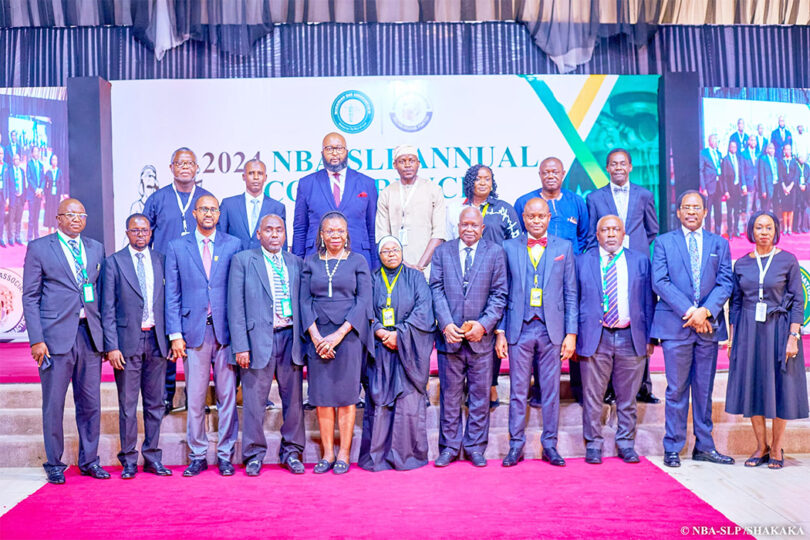Just a few weeks ago, the Attorney General of the Federation (AGF) and Minister of Justice, Lateef Fagbemi (SAN) gathered members of the legal profession alongside other critical stakeholders in the justice sector at the Federal Capital Territory (FCT) to fashion out what was termed a clear strategy that will reposition and strengthen the justice sector.
Indeed the organisers of that programme noted that the move was to ensure greater access, transparency, accountability, fairness and efficiency in the entrenchment of the rule of law in Nigeria and administration of justice in general.
In the same vein, the Nigerian Bar Association Section on Legal Practice (NBA-SLP), also recently gathered the crème de la crème of the profession in the ancient city of Kano, also in a bid to uproot encumbrances to effective administration of justice in the country.
Although the occasion was the 2024 Annual Conference of the NBA-SLP, the theme, “Administration of Justice in Nigeria: Challenges and Reforms” was a reflection of the concerns about the state of justice administration in the country, and the need for urgent reforms.
According to the Chairman of the NBA-SLP, Mrs. Boma Alabi (SAN), the theme of the conference reflected the ongoing battle to continually improve on the practice of the legal profession to ensure that justice is delivered expeditiously.
Alabi further observed that: “The conference aimed to critically assess the current state of the justice system, identify its most pressing challenges, and propose innovative solutions to foster a more efficient, equitable, and accessible legal framework for all Nigerians”.
In a welcome address, the Chairman of the Kano branch of the NBA, Sagir Gezawa, pointed out that there was no better time to discuss the challenges of administration of justice in Nigeria than now.
He cited public perception, political interference as well as the need to strengthen the system as reasons for the theme.
Similarly, the Chairman of the Conference Planning Committee, Dr. Sulaiman Usman (SAN), who observed that it is the responsibility of legal practitioners to ensure the fair and efficient administration of justice however, noted that the country’s justice system currently “faces a myriad of challenges that hinders its effectiveness”.
He listed them as: “The scourge of corruption to crippling backlog of cases, from inadequate funding to the lack of public confidence.” Usman added that it was during such conferences that they could find an opportunity to come together and engage in critical discussions so as to “chart a course towards meaningful reforms”.
The Chief Judge of Kano State, Justice Dije Aboki and the President of the National Industrial Court of Nigeria (NICN), Justice Benedict Kanyip, were among judges and lawyers who also clamoured for urgent reforms not just for the sake of achieving speedy and quality justice delivery but to also restore the dwindling respect and confidence of litigants and Nigerians in general.
“As we gather here, we must engage in a candid dialogue about the state of justice in our great nation,” Aboki said.
She added: “The administration of justice in Nigeria faces numerous challenges that demand our immediate attention. On the part of the judiciary, one of the foremost challenges is the issue of judicial independence.
“For justice to be truly impartial, the judiciary must be free from undue influence and interference from other arms of government. This independence is not for the benefit of the judiciary alone but is the bedrock of fair and equitable justice delivery to the citizens we serve.”
The Kano CJ stressed that both the bar and the bench must continuously strive to promote the achievement of their independence to maintain the integrity of the judicial system. In addition, she urged that the NBA as a pressure group, is not meant only to advocate the interest of lawyers but also to serve as a mouthpiece for the judiciary, adding that more should be done in advocating for judicial independence and autonomy.
Besides the issue of judicial independence, another pressing challenge she identified was the chronic backlog of cases in courts, wherein she noted that the saying “justice delayed is justice denied” rings true in that context. Others, she said, are the lack of accountability as well as unethical practices by lawyers.
Putting the current state of administration of justice in proper perspective, the President of the National Industrial Court recalled the recent warning of Prof. Ademola Popoola of the Obafemi Awolowo University, Ile Ife, that “threats to the rule of law and independence of the judiciary” from various sources if not quickly arrested would spell doom for the judiciary and by extension the country.
According to Popoola: “Unless the Nigerian judiciary transmogrifier as the dictates of globalisation, information technology, development, etc impact on national laws, we may find ourselves left out of the scheme of things.”
Buttressing this point, the NICN president cited a former governor’s description of the Nigerian judiciary as “pathetic, too slow and often on the side of crooks rather than on the side of government or the innocent.”
Kanyip also recalled some senior lawyers describing courts as supermarkets where only the rich go to shop and that “Nigerian Judiciary is Crooked”.







